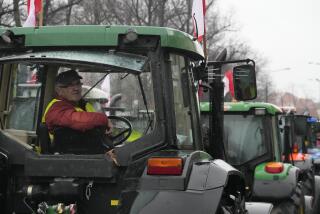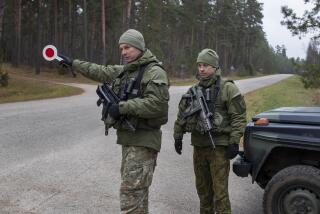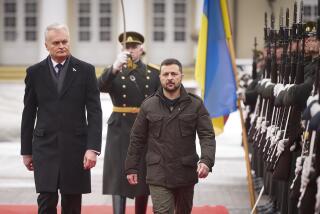Gorbachev Sees 2 Baltic Chiefs, Refuses to Yield : Secession: Lithuania halts gasoline sales for private use. In Estonia, pro-Moscow strikes enter the second day.
- Share via
MOSCOW — Soviet President Mikhail S. Gorbachev took a step toward dialogue with the Baltics on Tuesday by meeting with the Estonian and Latvian presidents, but he stuck to his hard line against independence, reports said.
Lithuania, struggling with an economic blockade the Kremlin imposed to weaken its independence campaign, said gasoline sales for private cars will be banned as of today.
But a government spokesman said the Lithuanian Cabinet has rejected any idea of suspending the republic’s independence declaration to placate the Kremlin.
The Soviet president, who met last week with Lithuania’s prime minister, sat down for 20 minutes with Presidents Anatoly Gorbunov of Latvia and Arnold Ruutel of Estonia, the Estonian News Service reported.
Gorbachev reportedly told them the same thing he told Lithuania’s Kazimiera Prunskiene: The Baltic republics must either suspend or revoke their declarations of independence.
The Estonian News Service, an independent information agency, quoted Ruutel as saying there was a common understanding of the need for dialogue, but he characterized the meeting as “unpleasant” for both sides.
Lithuania, Latvia and Estonia are in varying stages of efforts to restore the independence they enjoyed before the Soviet Union forcibly annexed them 50 years ago. The Kremlin has declared the independence declarations illegal. It imposed a blockade of oil, gas and other supplies on Lithuania, which led the independence movement with its March 11 declaration.
On Tuesday, Lithuanian legislators debated measures on holding the economy together during the blockade and on adopting an approach toward Moscow, the Parliament’s information bureau said.
Starting today, gasoline will be sold in Lithuania only for ambulances, police cars, fire trucks, food trucks, armored cars, hearses and agricultural equipment, Algirdas Brazauskas, head of the government’s anti-blockade committee, told Parliament. Some gas will be available for limited public transport, Brazauskas said.
A strike by pro-Moscow forces in Estonia was in its second day, with workers at two more plants joining the protest against the republic’s independence drive, a strike committee spokesman said.
The Tass news agency said the strike has spread to coal mines, shipyards and the Krengolmskaya manufacturing mills, the republic’s largest light industry enterprise.
Bush Administration officials said Tuesday that American businesses can help rescue the Soviet economy, but they warned that a trade accord could be imperiled if Moscow continues to enforce a blockade against Lithuania.
“If sanctions are still being applied in Lithuania . . . it is going to be very difficult to persuade the American Congress to let the commercial agreement go into effect,” U.S. Ambassador Jack F. Matlock told a meeting of the U.S-U.S.S.R. Trade and Economic Council in Moscow.
Under a tentative agreement, reached earlier this month, Washington would lift the Jackson-Vanik amendment to the 1974 Trade Act, extend most-favored-nation trade benefits to the Soviet Union and ease restrictions on transfers of technology to Eastern Europe.
More to Read
Sign up for Essential California
The most important California stories and recommendations in your inbox every morning.
You may occasionally receive promotional content from the Los Angeles Times.













